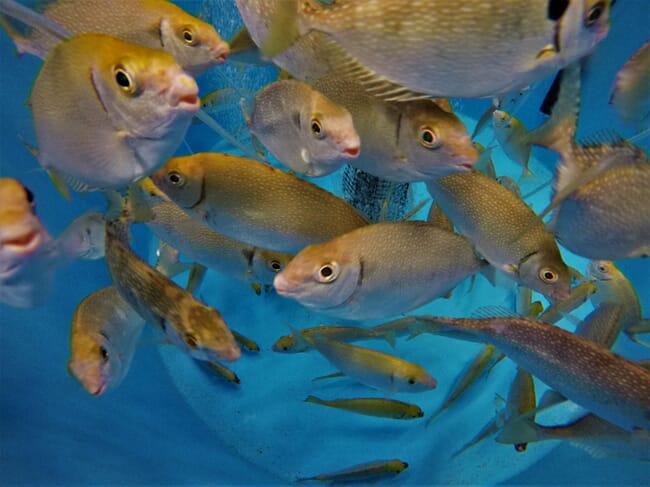
© Valentin Thepot
Blueyou has calculated that every year, 2 - 3 trillion aquatic animals are harvested, caught and killed in fisheries and aquaculture for human consumption. This number is 35 times higher than globally farmed and slaughtered land animals combined. Yet historically, unlike in other animal-farming sectors, animal welfare in capture fisheries and aquaculture has been excluded from meaningful welfare consideration and, today, is still not addressed by most seafood producers, distributors, food service companies, and retailers.
Despite its expertise and experience in working with producers, Blueyou says that the fact that it is only now rolling out a specific animal welfare policy reflects how the seafood industry is just starting to address animal welfare. Aquatic Life Institute is confident that Blueyou’s commitment to welfare will pave the way for other seafood companies to follow in their steps to meet the growing demand for comprehensive policies from consumers.
Aquatic Life Institute was intricately involved in providing edits and suggestions to the new welfare policy prior to publication, and remains impressed with Blueyou's vision and commitment. As Aquatic Life Institute is dedicated to supporting and accelerating activities that positively impact aquatic life, the organisation focuses on the highest-impact welfare interventions for all aquatic animals on a global scale. In working with companies like Blueyou, Aquatic Life Institute aims to encourage comprehensive sustainability policies that include animal welfare as they can help businesses overall - by attracting and retaining customers, building brand loyalty, reducing risks, and setting companies apart from other competitors - on top of the ethical considerations.
“Blueyou’s visionary and clear animal welfare policy is the strongest example that we have seen to date from a major seafood company. Their specific language around minimizing animals’ stress and suffering, educating the supply chain around them to create a domino effect, and a commitment to publicly reporting on progress is an excellent model for other seafood companies to adopt. We applaud Blueyou for taking this significant step forward in their business priorities.” stated Sophika Kostyniuk, managing director, Aquatic Life Institute, in a press release.
“We believe that future seafood origins must be aligned with the planetary boundaries in terms of the environmental impact dimension, including climate change,” said René Benguerel, founder and managing director of Blueyou. “However, of equal importance for Blueyou is the social and community-dimension of the seafood industry, a well as the animal welfare of the species being caught and harvested for human consumption – including the species which are affected by indirect side-effects of the industry, such as aquatic animals being used for feed in the farmed sector as well as those being affected by the wild capture fisheries, such as the bait species and by-catch.”



